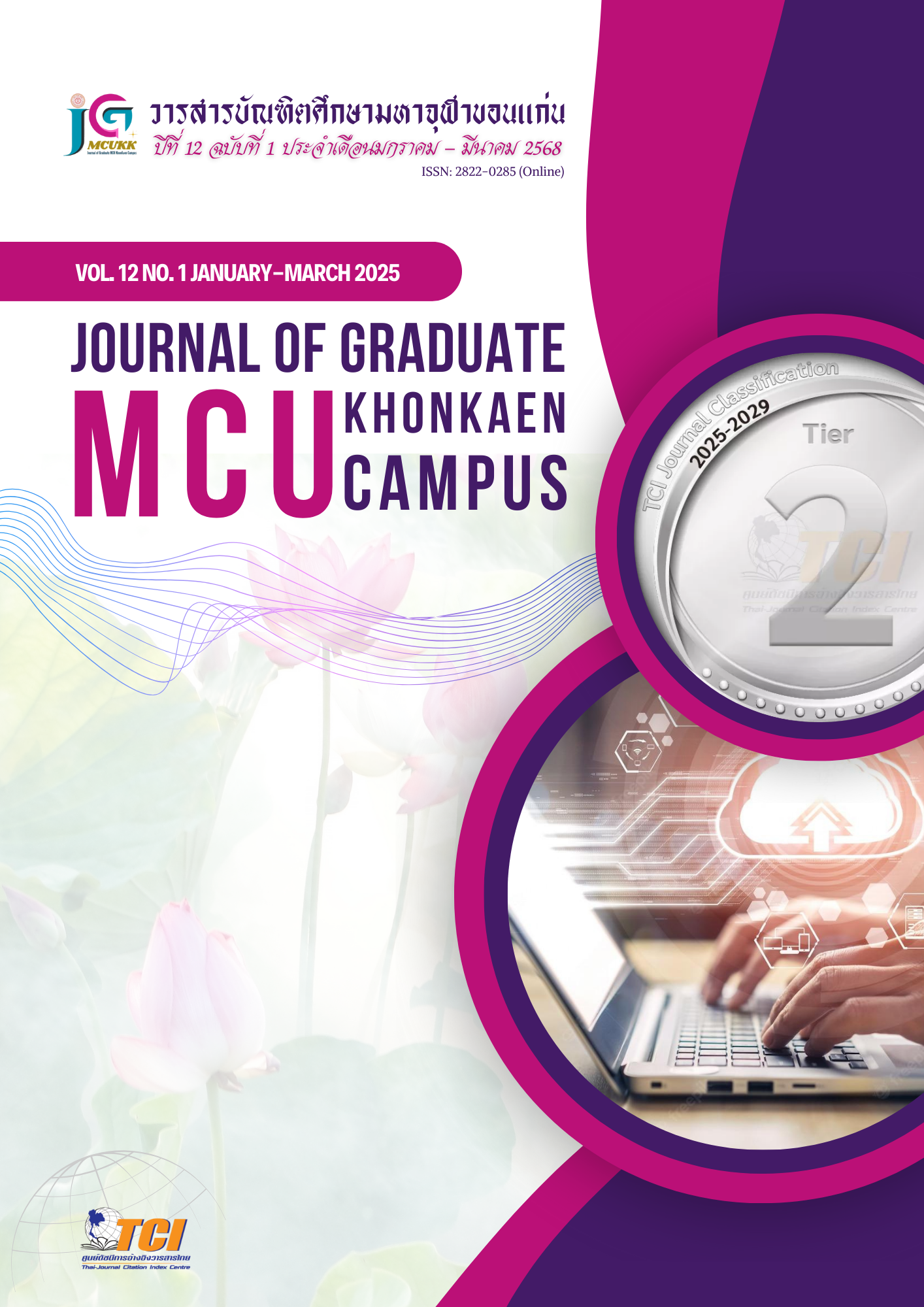Guidelines for Academic Administration of School Administrators in Response to change in the Era of Disruption under KhonKaen Primary Educational Service Area Office 1
Main Article Content
Abstract
The objectives of this research were 1) to study the current situation and the desirableconditions of academic administration of school administrators in response to change in the era of disruption, 2) to study the needs for academic administration of school administrators in response to change in the era of disruption, and 3) to recommend the guidelines for academic administration of school administrators in response to change in the era of disruptionunder KhonKaen Primary Educational Service Area Office 1. This research was a mixed-method research. The sample group used in the research included334 school administrators and teachers under KhonKaen Primary Educational Service Area Office 1. The sample size was determined by calculating Taro Yamane
formula using stratified random sampling method. The instrument used to collect data was a 5-level rating scale questionnaire with content validity at1, a reliability of the current situation and the desirableconditionquestionnaire at0.87 and at 0.83,
respectively. The statistics used for data analysis comprised percentage, frequency, mean, standard deviation, PNI modified index, median, and interquartile range.
The research results were found that:
1) The current situationof academic administration of school administrators in response to change in the era of disruption, in overall,was rated at a high level.
The desirable conditions, in overall,were at the highest level.
2) The needs for academic administration of school administrators in response to change in the era of disruption, considering each aspect, were found that the aspect with the highest level of needs was the aspect of the development of school’s curriculum.
3) Guidelines for academic administration of school administrators in response to change in the era of disruption were found that:1) In the aspect of the development of school’s curriculum,schools should analyze the needs and expectations consistent with the level of curriculum from the stakeholder’s groups by various methods to obtain the necessary and important information for the curriculum. 2)In aspect of measurement, evaluation and transfer, there should be measurement and evaluation of learners’
learning results using various methods by separating the academic abilities from learners’ behaviorsclearly. 3)In aspect ofeducational supervision, there should be promotion of kanlayanamitra supervision through guidance or coaching. 4) In aspect ofdevelopment and improvement of internal quality assurance and educational standards, there should be a clear working committee appointment and roles and responsibilities definition to set goals for the success of schools in line with national educational standards.5) In aspect of the development of learning process, there should be opportunities offeredto learners to design their learning in line with their desired learning outcomes. 6) In aspect of research to develop the educational quality of schools, the research results should be used as a guideline for improving or developing the performance of school to be more efficient.
Article Details

This work is licensed under a Creative Commons Attribution-NonCommercial-NoDerivatives 4.0 International License.
References
โมนา ชัยกฤตทองกุล, สมชาย อังสุโชติเมธี และ สุบัน พรเวียง. (2567). แนวทางการพัฒนาการบริหารงานวิชาการในยุคดิจิทัลของผู้บริหารโรงเรียนขนาดเล็ก สังกัดสำนักงานเขตพื้นที่การศึกษามัธยมศึกษากำแพงเพชร. วารสารมหาจุฬานาครทรรศน์, 11(6), 32-42. https://so03.tci-
thaijo.org/index.php/JMND/article/view/277833
ไชยา ภาวะบุตร. (2565). ภาวะผู้นำทางวิชาการ. (พิมพ์ครั้งที่ 3). ห้างหุ้นส่วนจำกัด สมศักดิ์การพิมพ์ กรุ๊ป.ธานินทร์ ศิลป์จารุ. (2555). การวิจัยและวิเคราะห์ข้อมูลทางสถิติด้วย SPSS. (พิมพ์ครั้งที่ 13). นนทบุรี: สำนักพิมพ์ เอส.อาร์.พริ้นติ้ง แมสโปรดักส์.
นัตพงษ์ ช่ออังชัน และ วัลลภา อารีรัตน์. (2565). แนวทางการบริหารงานวิชาการตามแนวคิดวิถีใหม่ในสถานศึกษา สังกัดสำนักงานเขตพื้นที่การศึกษาประถมศึกษาหนองคาย เขต 2. วารสารปัญญาปณิธาน, 7(2), 255-268. https://so05.tci-thaijo.org/index.php/PPJ/article/view/
รุ่งทิวา แย้มรุ่ง, กิตติชัย สุธาสิโนบล, และ พัฒน์นรี จันทราภิรมย์. (2565). ยุคการเปลี่ยนแปลงของโลกกับความท้าทายในการพัฒนาเด็กปฐมวัย. วารสารคหเศรษฐศาสตร์, 65(2), 1-13.
สำนักงานเขตพื้นที่การศึกษาประถมศึกษาขอนแก่น เขต 1. (2566). แผนพัฒนาคุณภาพการศึกษาประจำปี พ.ศ.2566 - 2570. ขอนแก่น: สำนักงานเขตพื้นที่การศึกษาประถมศึกษาขอนแก่น เขต 1.
สุกัญญา แช่มช้อย. (2565). การบริหารวิชาการที่ตอบสนองการเปลี่ยนแปลงของโลกยุคพลิกผัน. สำนักพิมพ์จุฬาลงกรณ์มหาวิทยาลัย.
สุภีร์ โลไธสง, อัจฉรา นิยมาภา และ วีรภัทร ภัทรกุล. (2567). แนวทางการบริหารงานวิชาการภายหลังสถานการณ์โควิด-19 ของสถานศึกษา สังกัดสำนักงานเขตพื้นที่การศึกษาประถมศึกษาสระบุรี เขต 1. วารสารมหาจุฬาวิชาการ, 11(2), 217-232. https://so04.tci-thaijo.org/index.php/
JMA/article/view/269379
Radivojevic, N., Pajic, V., & Osmanovic, S. (2024). The Influence of Organizational Factors on the School’s Achievements. International Journal of Cognitive Research in Science, Engineering & Education (IJCRSEE), 12(1), 169-183. https://doi.
org/10.23947/2334-8496-2024-12-1-169-183
Yamane, Taro. (1973). Statistics: An Introductory Analysis.Tokyo: Harper International Edition.

